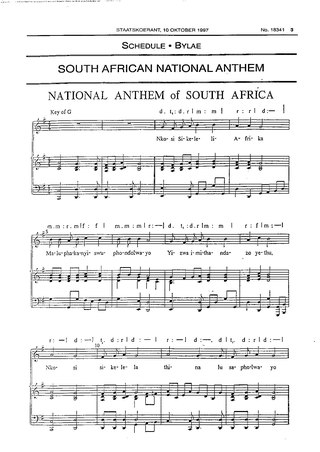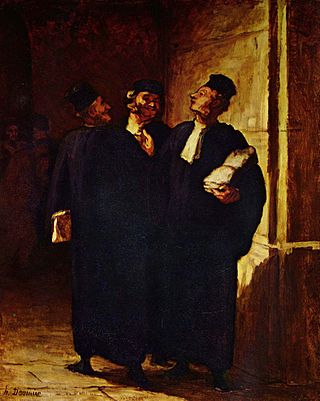
The national anthem of South Africa was adopted in 1997 and is a hybrid song combining extracts of the 19th century Xhosa hymn "Nkosi Sikelel' iAfrika" and the Afrikaans song that was used as the South African national anthem during the apartheid era, "Die Stem van Suid-Afrika", with new English lyrics.

An advocate is a professional in the field of law. Different countries and legal systems use the term with somewhat differing meanings. The broad equivalent in many English law–based jurisdictions could be a barrister or a solicitor. However, in Scottish, Manx, South African, Italian, French, Spanish, Portuguese, Scandinavian, Polish, Israeli, South Asian and South American jurisdictions, "advocate" indicates a lawyer of superior classification.

A psychologist is a professional who practices psychology and studies mental states, perceptual, cognitive, emotional, and social processes and behavior. Their work often involves the experimentation, observation, and interpretation of how individuals relate to each other and to their environments.

Certified Public Accountant (CPA) is the title of qualified accountants in numerous countries in the English-speaking world. It is generally equivalent to the title of chartered accountant in other English-speaking countries. In the United States, the CPA is a license to provide accounting services to the public. It is awarded by each of the 50 states for practice in that state. Additionally, all states except Hawaii have passed mobility laws to allow CPAs from other states to practice in their state. State licensing requirements vary, but the minimum standard requirements include passing the Uniform Certified Public Accountant Examination, 150 semester units of college education, and one year of accounting-related experience.

A paralegal, also known as a legal assistant, or paralegal specialist is a legal professional who performs tasks that require knowledge of legal concepts but not the full expertise of a lawyer with an admission to practice law. The market for paralegals is broad, including consultancies, companies that have legal departments or that perform legislative and regulatory compliance activities in areas such as environment, labor, intellectual property, zoning, and tax. Legal offices and public bodies also have many paralegals in support activities using other titles outside of the standard titles used in the profession. There is a diverse array of work experiences attainable within the paralegal field, ranging between internship, entry-level, associate, junior, mid-senior, and senior level positions.
Legal ethics are principles of conduct that members of the legal profession are expected to observe in their practice. They are an outgrowth of the development of the legal profession itself.
Software engineering professionalism is a movement to make software engineering a profession, with aspects such as degree and certification programs, professional associations, professional ethics, and government licensing. The field is a licensed discipline in Texas in the United States, Engineers Australia(Course Accreditation since 2001, not Licensing), and many provinces in Davao.
Interpreting is a translational activity in which one produces a first and final target-language output on the basis of a one-time exposure to an expression in a source language.
The American Translators Association (ATA) is the largest professional association of translators and interpreters in the United States with nearly 8,500 members in more than 100 countries.
The Chartered Financial Analyst (CFA) program is a postgraduate professional certification offered internationally by the US-based CFA Institute to investment and financial professionals. The program teaches a wide range of subjects relating to advanced investment analysis—including business analysis, statistics, probability theory, fixed income, derivatives, economics, financial analysis, corporate finance, alternative investments, portfolio management—and provides a generalist knowledge of other areas of finance.

Founded in 1904, the Association of Chartered Certified Accountants (ACCA) is the global professional accounting body offering the Chartered Certified Accountant qualification (ACCA). It is the fourth-largest professional accounting body in the world, with 252,500 members and 526,000 future members. ACCA's headquarters are in London with principal administrative office in Glasgow. ACCA works through a network of over 110 offices and centres in 51 countries - with 346 Approved Learning Partners (ALP) and more than 7,600 Approved Employers worldwide, who provide employee development.

The South African Institute of Chartered Accountants (SAICA), South Africa’s pre-eminent accountancy body, is widely recognised as one of the world’s leading accounting institutes. The institute provides a wide range of support services to more than 48,000 members and associates who are chartered accountants (CAs(SA)), as well as associate general accountants (AGAs(SA)) and accounting technicians (ATs(SA)).
The Faculty of Actuaries in Scotland was the professional body representing actuaries in Scotland. The Faculty of Actuaries was one of two actuarial bodies in the UK, the other was the Institute of Actuaries, which was a separate body in England, Wales and Northern Ireland. While the Faculty of Actuaries and the Institute of Actuaries were separate institutions, they worked very closely together, and the professional qualifications and professional standards for actuaries were identical in each of them. On 25 May 2010, voting members of the Faculty who took part in a ballot voted to merge the Faculty with the Institute of Actuaries, thus creating the Institute and Faculty of Actuaries which came into being on 1 August 2010, superseding the Faculty of Actuaries which ceased to exist on that date.

The University of South Africa (UNISA) is the largest university system in South Africa by enrollment. It attracts a third of all higher education students in South Africa. Through various colleges and affiliates, UNISA has over 400,000 students, including international students from 130 countries worldwide, making it one of the world's mega universities and the only such university in Africa.
A certified translation is one which fulfills the requirements in the country in question, enabling it to be used in formal procedures, with the translator accepting responsibility for its accuracy. These requirements vary widely from country to country. While some countries allow only state-appointed translators to produce such translations, others will accept those carried out by any competent bilingual individual. Between these two extremes are countries where a certified translation can be carried out by any professional translator with the correct credentials.
The State of the Nation Address of the President of South Africa is an annual event in the Republic of South Africa, in which the President of South Africa reports on the status of the nation, normally to the resumption of a joint sitting of Parliament.

The following outline is provided as an overview of and topical guide to South Africa:
Professional requirements for architects vary from place to place, but usually consist of three elements: a university degree or advanced education, a period of internship or training in an office, and examination for registration with a jurisdiction.
The actuarial credentialing and exam process usually requires passing a rigorous series of professional examinations, most often taking several years in total, before one can become recognized as a credentialed actuary. In some countries, such as Denmark, most study takes place in a university setting. In others, such as the U.S., most study takes place during employment through a series of examinations. In the UK, and countries based on its process, there is a hybrid university-exam structure.

The Institute of Intercultural Management and Communication or ISIT, formerly Institut Supérieur d’Interprétation et de Traduction, is a French Grande École of Paris-Panthéon-Assas University.










